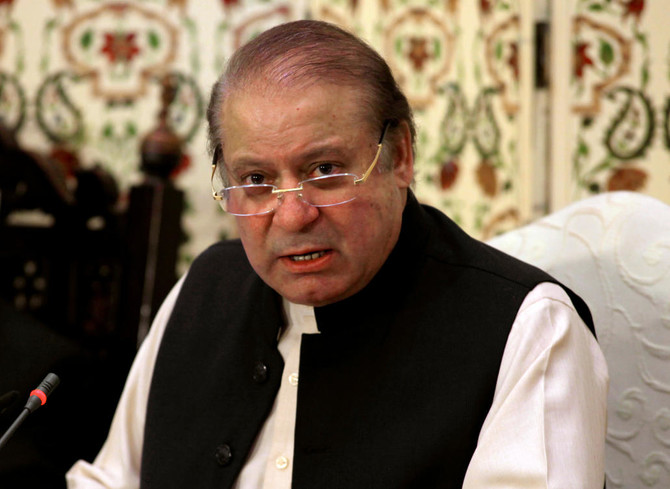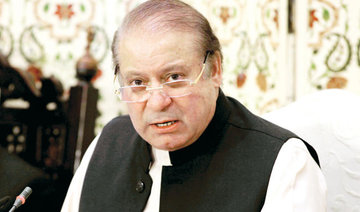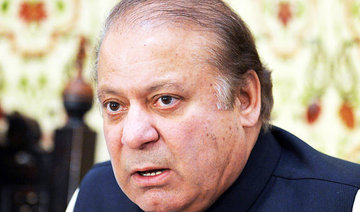ISLAMABAD: A Pakistani court on Thursday issued arrest warrants for ousted Prime Minister Nawaz Sharif in two cases of corruption spiraling from the Panama Papers leak, his lawyers said.
Sharif is currently in London with his wife Kalsum as she undergoes cancer treatment, and has not returned to Pakistan since he was indicted in the corruption allegations earlier this month, despite reports he would do so.
“The accountability court issued bailable warrants for the former prime minister in two cases of alleged corruption today and adjourned (the) hearing until November 3,” one of his defense lawyers, Zafir Khan said.
In late July the Supreme Court sacked Sharif following an investigation into corruption allegations against his family, making him the 15th premier in Pakistan’s 70-year history to be ousted before completing a full term.
The claims against the prime minister stemmed from the Panama Papers leak last year, which sparked a media frenzy over the luxurious lifestyles and high-end London property portfolio owned by his family.
Sharif has faced — and come back from — similar challenges in the past.
In 1993 he was sacked from his first term as premier for corruption, while in 1999 he was sentenced to life in prison after his second term in office ended with a military putsch.
Following the coup he was allowed to go into exile in Saudi Arabia, returning in 2007 before becoming prime minister for a third time in 2013.
Last month his wife Kalsum won his former parliamentary seat during a heated by-election in Lahore, in a poll seen as a key test of the ruling party’s popularity after Sharif’s sacking and ahead of a general election due to be held sometime next year.
Pakistan court issues arrest warrant for ex-PM Sharif
Pakistan court issues arrest warrant for ex-PM Sharif

Pakistan concludes week-long anti-polio drive in southwestern province hit hardest by disease

- Pakistan to hold next polio drive in Balochistan during first week of February, says official
- Pakistan reported 68 polio cases last year out of which 27 were from Balochistan province
QUETTA: Pakistani health authorities on Monday concluded a week-long polio campaign in its southwestern Balochistan province, hit hardest by the disease, amid looming security threats to vaccinators and security forces guarding them.
Pakistan kickstarted the polio drive on Dec. 30 to vaccinate 2.6 million children against the disease in Balochistan. Pakistan reported 68 polio cases last year out of which 27 were from Balochistan. The northwestern Khyber Pakhtunkhwa and southern Sindh provinces each recorded 19 cases while the eastern Punjab province and Islamabad each reported one case.
Pakistan, along with neighboring Afghanistan, remains the last polio-endemic country in the world.
“We have achieved our set target in the last province-wide anti-polio campaign,” Dr. Aftab Kakar, the provincial team lead at the National Stop Transmission of Polio (NSTOP) program told Arab News.
“We had set a target to vaccinate more than 2.6 million children but are gathering entry data from all districts but due to the suspension of mobile service in Quetta, some entries are pending.”
Polio is a paralyzing disease with no cure. To provide high immunity against the virus, multiple doses of the oral polio vaccine and completion of the routine vaccination schedule for all children under the age of five are essential.
“We are planning our next anti-polio drive in the first week of February 2025 with further training to the polio staff across Balochistan to make next drives more effective,” Kakar said. “We are very much optimistic that polio cases will decline this year because we have noticed a major decline since September and October 2024.”
Pakistan’s polio program began in 1994 but efforts to eradicate the virus have since been undermined by vaccine misinformation and opposition from some religious hard-liners, who say immunization is a foreign ploy to sterilize Muslim children or a cover for Western spies. Militant groups also frequently attack and kill members of polio vaccine teams.
On Dec. 18, provincial health authorities postponed the nationwide anti-polio drive twice due to security reasons and a boycott by health staffers. The virus killed three children, including a minor girl, in Balochistan’s Quetta, Zhob and Killa Abdullah districts last year.
In the early 1990s, the country reported around 20,000 cases annually, but in 2018, the number dropped to eight cases. Six cases were reported in 2023 and only one in 2021.
Japan hopes to attract more Saudi travelers through exhibitions in Kingdom

DUBAI: As Japan and Saudi Arabia approach their 70th anniversary of diplomatic relations, the Japan National Tourism Office is planning more exhibitions to attract Saudi travelers, the organization’s Dubai executive director Daisuke Kobayashi said.
Kobayashi told Arab News Japan that JNTO hopes to maintain “strong partnerships” with local travel agencies and related organizations.
“Through these collaborations, we aim to deliver more comprehensive and engaging information to Saudi travelers, encouraging them to discover the unique experiences Japan has to offer,” he said.
There are as yet no plans to open a JNTO office in Saudi Arabia, Kobayashi said. However, he confirmed that the organization will continue its promotional activities in the Kingdom to meet the growing interest in Japan from Saudi travelers.
In December 2024, JNTO held its first event in Riyadh, titled “Feel Your Four Seasons.”
The exhibition provided visitors with an introduction to Japan’s diverse seasonal attractions, including luxury travel experiences.
Kobayashi told Arab News Japan that since the event, JNTO had observed a “significant increase in Saudi travelers’ interest in visiting Japan.”
“During the event, we noted a strong desire among attendees to travel to Japan, particularly in the spring to experience cherry blossoms,” he said. “We also noticed growing curiosity about Japan’s summer and winter offerings. Visitors showed interest in natural landscapes, summer festivals, and winter activities such as enjoying snow-covered scenery.”
Expo 2025 Osaka, Kansai in April is also a big tourist attraction for Saudi and GCC travelers.
According to Kobayashi, travelers from the region are usually most interested in traditional Japanese accommodations such as ryokan (Japanese-style inns), which often include onsen (hot spring) experiences and authentic Japanese cuisine.
Anime and manga’s popularity in the Middle East is also a key reason why Arab travelers choose Japan for a vacation.
From a cultural aspect, Kobayashi said that Japanese and Arab cultures share similar values, which can help to put Saudi travelers at ease.
“The cultural parallels create a sense of familiarity and comfort for travelers from Saudi Arabia and the broader GCC region when visiting Japan,” he said. “Whether it’s exploring Japan’s traditional tea ceremonies, staying in ryokan, or simply interacting with the warm and respectful Japanese hospitality, these experiences resonate deeply with visitors from Saudi Arabia.”
According to Kobayashi, in the first half of 2024, there was a 72.2 percent increase in visitors from Saudi Arabia to Japan, compared with the same period in 2023.
Oil Updates — prices ease from near 3-month highs amid strong dollar ahead of economic data

- Brent crude futures slid 21 cents, or 0.3%, to $76.3 a barrel
- Dollar stayed close to a two-year peak on Monday
SINGAPORE: Oil prices slid on Monday amid a strong US dollar, concerns over sanctions and ahead of key economic data by the US Federal Reserve and US payrolls later in the week.
Brent crude futures slid 21 cents, or 0.3 percent, to $76.3 a barrel by 7:45 a.m. Saudi time after settling on Friday at its highest since Oct. 14.
US West Texas Intermediate crude was down 19 cents, or 0.3 percent, at $73.77 a barrel after closing on Friday at its highest since Oct. 11.
Oil posted five-session gains previously with hopes of rising demand following colder weather in the Northern Hemisphere and more fiscal stimulus by China to revitalize its faltering economy.
However, the strength of the dollar is on investor’s radar, Priyanka Sachdeva, a senior market analyst at Phillip Nova, wrote in a report on Monday.
The dollar stayed close to a two-year peak on Monday, a stronger dollar makes it more expensive to buy the greenback-priced commodity and hence reins in pressure on oil.
Investors are also awaiting economic news for more clues on the Federal Reserve’s rate outlook and energy consumption.
Minutes of the Fed’s last meeting is due Wednesday and the December payrolls report will come on Friday.
Also weighing on sentiment was supply disruptions of Iranian and Russian oil as Western countries ramped up their sanctions.
The Biden administration plans to impose more sanctions on Russia over its war on Ukraine, taking aim at its oil revenues with action against tankers carrying Russian crude, two sources with knowledge of the matter said on Sunday.
Goldman Sachs expects Iran’s production and exports to fall by the second quarter as a result of expected policy changes and tighter sanctions from the administration of incoming US President Donald Trump.
Output at the OPEC producer could drop by 300,000 barrels per day to 3.25 million bpd by second quarter, they said.
The US oil rig count, an indicator of future output, fell by one to 482 last week, a weekly report from energy services firm Baker Hughes showed on Friday.
Still, the global oil market is clouded by a supply surplus this year as a rise in non-OPEC supplies is projected by analysts to largely offset global demand increase, also with the possibility of more production in the US under Trump.
UAE’s non-oil activity sees PMI hit 9-month high; Egypt’s output declines: S&P Global

RIYADH: Non-oil business activity in the UAE surged in December, with the Emirates’ Purchasing Managers’ Index jumping to a nine-month high of 55.4, up from 54.2 in November, an economy tracker showed.
According to S&P Global, the robust expansion was driven by strong demand conditions, underscoring continued growth in the non-oil private sector.
The performance aligns with the UAE’s broader diversification strategy under its Vision 2031, which focuses on expanding the non-oil sector and promoting industries such as manufacturing, tourism, and technology to ensure sustainable economic growth.
“The UAE saw its best expansion in non-oil business conditions for nine months in December, with the latest PMI data closing out another year of continuous growth and putting the sector in a strong position for 2025,” said David Owen, senior economist at S&P Global Market Intelligence.
Any PMI readings above 50 indicate growth in the non-oil sector, while readings below 50 signal contraction, S&P Global noted.
Non-oil business owners surveyed said buoyant market conditions helped them secure new clients and larger order books. However, staffing levels rose at one of the slowest rates in more than two-and-a-half years.
“Capacity levels remain under considerable stress, however, illustrated by another marked increase in backlogs of work. Recruitment appears to be the limiting factor — the pace of employment growth was barely changed from November’s 31-month low,” said Owen.
He added that rising costs and margin pressures discouraged firms from ramping up staffing levels despite growing workloads.
Input costs increased during December, although inflation eased to its softest pace since March. Meanwhile, optimism among non-oil firms about future growth ticked down for the second consecutive month.
Dubai’s PMI also reached a nine-month high of 55.5 in December, up from 53.9 in the previous month.
The emirate saw faster expansions in output and new orders, reflecting stronger client demand and busy market conditions.
“In both cases, rates of growth were stronger than those observed at the UAE level,” said S&P Global.
However, the report highlighted weaker optimism among non-oil business firms in Dubai regarding the coming year, with confidence falling to its lowest level since May 2021. Only 6 percent of surveyed companies anticipated output growth in 2025.
The UAE’s performance highlights the success of economic diversification strategies across Gulf Cooperation Council nations, which continue to reduce reliance on oil revenues.
The region’s positive trend extended to Saudi Arabia, where the December PMI hit 58.4, driven by a sharp increase in new orders. The Kingdom’s PMI has remained above the neutral 50 mark since September 2020, underlining sustained expansion in the non-oil private sector.
Egypt’s PMI falls below 50
In contrast, Egypt’s PMI dropped to 48.1 in December from 49.2 in November, signaling a sharper contraction in private sector activity. Subdued client demand led to the steepest decline in output in eight months, particularly in the construction, wholesale, and retail sectors.
The analysis noted that activity in the services sector remained relatively stable, benefiting from a steadier level of new business compared to other monitored sectors.
“The latest Egypt PMI data showed that the non-oil private sector’s anticipated recovery is unlikely to be without its setbacks in 2025. With the Egyptian pound deteriorating against the US dollar, breaching the 50-per-dollar mark in early December, businesses reported higher prices and a slump in demand, leading to the fastest decline in operating conditions since last April,” said Owen.
He added: “The downturn meant that firms were less keen to raise their own charges in the face of accelerating cost burdens, instead tightening their margins in a bid to salvage orders.”
Egyptian businesses expressed improved optimism toward the end of 2024, anticipating better domestic and geopolitical conditions in 2025. However, inflationary concerns remained a significant headwind for many firms.
Russia says captured key town in eastern Ukraine

MOSCOW: Russian forces have captured the town of Kurakhove in eastern Ukraine, Russia’s defense ministry said on Monday, in a key advance after months of steady gains in the area.
Russian units “have fully liberated the town of Kurakhove — the biggest settlement in southwestern Donbas,” the ministry said on Telegram.

















